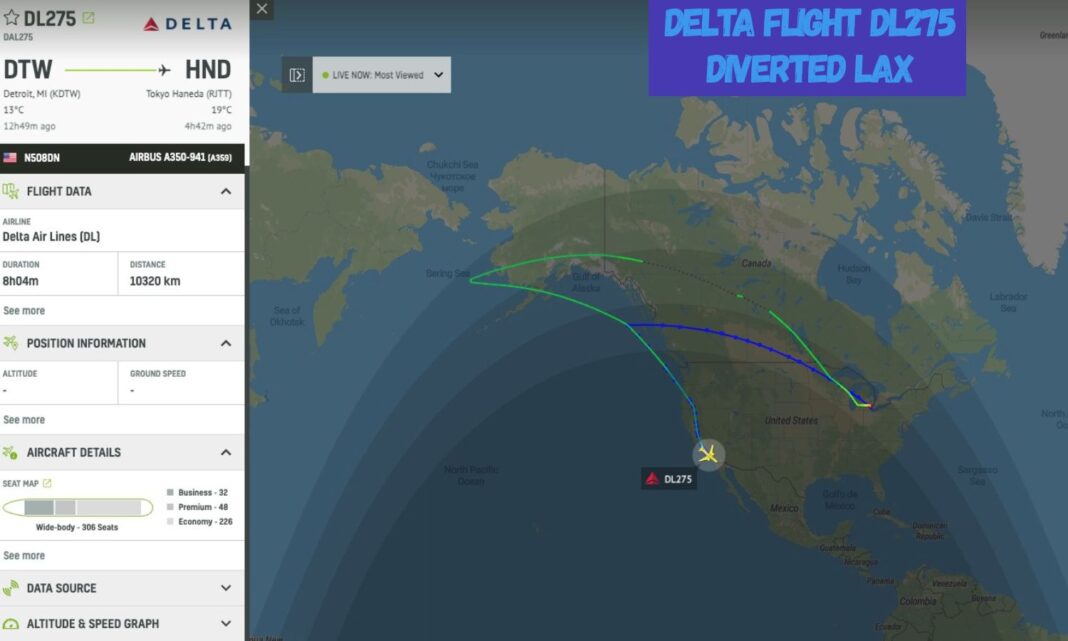Introduction
Delta Flight DL275 Diverted LAX – On May 27, 2025, what was expected to be a regular international trip turned into an unexpected event. While traveling from Detroit Metropolitan Airport (DTW) to Tokyo Haneda Airport (HND), Delta Flight DL275 was diverted mid-air to Los Angeles International Airport (LAX) due to a technical issue.
In this article, we will explain what went wrong, why the crew chose LAX as the diversion point, how the passengers were affected, and what this means for aviation safety moving forward.
Flight Overview
| Flight Details |
Information |
| Aircraft Type |
Airbus A350-900 |
| Date of Flight |
May 27, 2025 |
| Departure Airport |
Detroit (DTW) |
| Destination Airport |
Tokyo (HND) |
| Diversion Airport |
Los Angeles (LAX) |
| Reason for Diversion |
Engine anti-ice system issue |
| Crew Response |
Professional and calm |
| Outcome |
Safe landing, no injuries |
What is the Reason for the Diversion?
During the transpacific flight, about five hours in, the flight crew received an alert indicating a malfunction in the engine’s anti-ice system—a critical system that prevents dangerous ice buildup during high-altitude flights in cold areas such as the Bering Sea.
This issue, while not immediately life-threatening, could worsen in colder conditions. As a result, the flight crew made a cautious decision to divert to a safe airport before entering high-risk airspace.
Why Was LAX Chosen?
Many questioned why the flight did not land at a nearby airport. However, LAX was chosen for valid operational and safety reasons:
Key Reasons for Choosing LAX
| Maintenance Capability |
LAX has Delta-certified A350 and Rolls-Royce maintenance facilities. |
| Passenger Support Services |
Hotels, rebooking, meals, and multiple international flights are available. |
| Better Weather Conditions |
Southern California offers favorable landing conditions compared to northern airports. |
| Runway & Emergency Support |
Long runways and full emergency crew availability. |
| AI & Diagnostic Support |
LAX can support deeper diagnostics using predictive tools. |
The aircraft landed safely on Runway 06R at LAX in the early hours of May 28, 2025.
Passenger Effects
Delta Air Lines provided timely support to all passengers affected by the diversion. Passengers praised the professionalism of the crew, and no injuries were reported.
Support Provided by Delta
- Rebooking on new flights to Tokyo and other destinations
- Hotel accommodations for overnight stays
- Food vouchers and ground transportation
- Compensation according to Delta’s international travel policy
Passengers also shared their positive experiences on platforms such as Reddit and Twitter, highlighting how calmly and clearly the crew managed the situation.
Financial Impact on Delta
While safety is always the top priority, diversions come at a significant cost. Industry analysts estimate the total cost of this diversion at approximately:
| Cost Breakdown |
Estimated Value |
| Fuel and Rerouting |
$400,000+ |
| Maintenance and Downtime |
$600,000+ |
| Passenger Rebooking |
$700,000+ |
| Hotel & Meals |
$200,000+ |
| Estimated Revenue Loss |
$400,000+ |
| Total Estimated Cost |
$2.3 Million |
This incident also highlights the importance of predictive maintenance systems, including AI-powered diagnostics, which can detect failures before they pose a flight risk.
Lessons for the Aviation Industry
The DL275 incident is a reminder that even the most modern aircraft can face technical challenges. However, it also illustrates:
- The effectiveness of crew training
- The importance of real-time monitoring
- The advantage of having major hubs like LAX available for diversions
- The growing need for AI-based early detection systems
Summary Table: Delta Flight DL275 Diversion
| Aspect |
Details |
| Flight Path |
Detroit → Tokyo |
| Diversion Location |
LAX |
| Cause |
Engine anti-ice system failure |
| Aircraft |
Airbus A350-900 |
| Passengers Onboard |
200+ |
| Crew Response |
Timely, professional |
| Passenger Outcome |
No injuries, accommodations provided |
| Financial Impact |
~$2.3 Million |
| Industry Significance |
Highlights need for predictive safety systems |
Frequently Asked Questions (FAQ)
Why did Delta Flight DL275 divert to LAX?
The flight was diverted due to a malfunction in the engine’s anti-ice system. LAX was chosen because of its technical facilities, weather, and passenger service infrastructure.
Was anyone injured during the diversion?
No, all passengers and crew landed safely at LAX. Delta handled the situation professionally and provided assistance to all affected passengers.
Why not divert to Alaska or Seattle?
Those airports lacked the necessary Rolls-Royce engine maintenance, Delta hub presence, and favorable weather. LAX offered the best balance of safety and support.
What was the cost of the incident for Delta?
Analysts estimate a total cost of around $2.3 million, including rebooking, repairs, hotel accommodations, and revenue loss.
Has Delta commented on the incident?
While no public statement was released, internal sources confirmed that standard safety protocols were followed, and the issue is under investigation.
Final View
The diversion of Delta Flight DL275 to LAX may have disrupted some travel plans, but it serves as a model example of aviation safety in action. From the quick decision-making of the flight crew to the thorough support on the ground, every step was handled with professionalism.
It also reinforces the need for continued advancements in safety technology, especially AI-powered maintenance tools, to prevent future incidents.

